“The Face of Farming is changing and we’ve adjusted”
By Rhonda Strebel, executive director, Rural Health Initiative
The days I grew up on the “typical” family farm has changed significantly. You may remember a time when you visited your grandparents’ farm, helping them pick stones or bale hay. Or you have memories of long tables of families eating together with big meals of meat and potatoes, homemade apple pie and, of course, ice cream. Red barns speckled the countryside and the fields were filled with animals and crops.
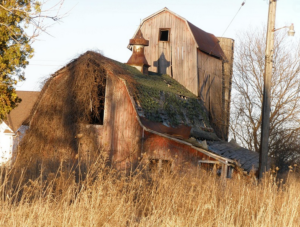 Today as we drive through rural areas, we see empty barns or subdivisions where farmland once was. The farms that remain are bigger and the amount of production expected from each to be profitable has grown immensely. The love of the land and the passion to feed others hasn’t changed but the hardships are real. Farm income this year is the lowest since 2006, a reflection of low commodity prices, exporting issues and, for many, weather conditions. More than 4% of Wisconsin dairy farms have gone out of business so far this year- with only 8,400 dairy farms left in the state.
Today as we drive through rural areas, we see empty barns or subdivisions where farmland once was. The farms that remain are bigger and the amount of production expected from each to be profitable has grown immensely. The love of the land and the passion to feed others hasn’t changed but the hardships are real. Farm income this year is the lowest since 2006, a reflection of low commodity prices, exporting issues and, for many, weather conditions. More than 4% of Wisconsin dairy farms have gone out of business so far this year- with only 8,400 dairy farms left in the state.
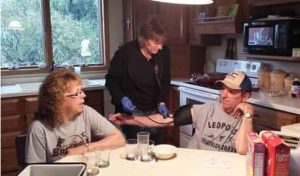 You might ask, as we do: who is going to feed this country? What can I do to help our local farmers?
You might ask, as we do: who is going to feed this country? What can I do to help our local farmers?
The Rural Health Initiative (RHI) started as one of ThedaCare’s first Community Health Action Team (CHAT) plunges in 2002. The plunge was a deep-dive visit to a farm to explore how we could improve and sustain the health and safety of farm families. During the plunge we learned:
- Farming is ranked as the #1 most hazardous occupation in the U.S.
- Farmers lack access to health care because of a shortage of rural providers and long travel times and distances to medical services.
- Many farmers lack health care insurance due to the unaffordable cost of premiums and high deductibles.
- Cultural barriers specific to farm families frequently prevent them from getting the help they need.
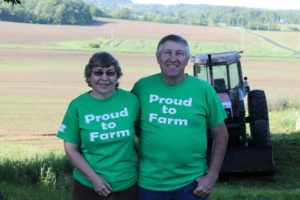 In 2004, the Rural Health Initiative, a nonprofit, was formed in Shawano County with the unique concept of Kitchen Wellness. The components include having an outreach health coordinator, who has a farming background to understand the farming lifestyle, make “house calls” to the farm where preventive services are provided. Complimentary services include a health assessment with immediate results for blood pressure, glucose, triglycerides, cholesterol, and biometrics; health coaching; and referrals.
In 2004, the Rural Health Initiative, a nonprofit, was formed in Shawano County with the unique concept of Kitchen Wellness. The components include having an outreach health coordinator, who has a farming background to understand the farming lifestyle, make “house calls” to the farm where preventive services are provided. Complimentary services include a health assessment with immediate results for blood pressure, glucose, triglycerides, cholesterol, and biometrics; health coaching; and referrals.
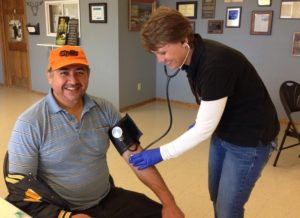 During the first five years, over 330 farm families were served, approximately 600 individuals or 40% of the farming population in Shawano County. Fifty-eight percent of the time an acute condition – very serious and potentially life-threatening – was detected. The farmers were typically small family farms and Amish.
During the first five years, over 330 farm families were served, approximately 600 individuals or 40% of the farming population in Shawano County. Fifty-eight percent of the time an acute condition – very serious and potentially life-threatening – was detected. The farmers were typically small family farms and Amish.
Today, we also go to many large dairies with Latino workers. These are still family run but, to have enough workers, they hire people. The reason we took the services to the farm is still great, it’s just a new face of farming we see, and unfortunately we are finding 52% of these folks have the same potential health risks as we saw in our previous years.
Here we are 15 years after that plunge! Thanks to the Community Foundation’s grants over more than $320,000 since we started including this year’s $1,500 grant from the John and Sally Mielke Family Fund, we have improved and sustained the health of hundreds of farm families, have grown to Shawano, Outagamie, and Waupaca counties, and continue to change with the times. Wisconsin farms may look different from years ago but they are still keeping food on our plates.
Visit us on our website for more info, and check out this video about Rural Health Initiatives:
Want more stories like these? Sign up to get in The Loop. And don’t forget to invite a friend to get in The Loop!
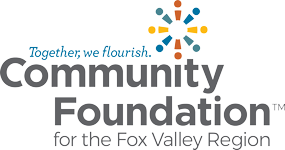


Leave a Comment